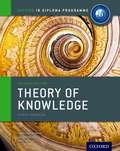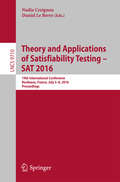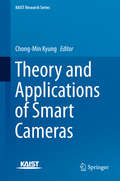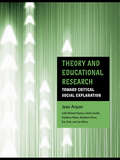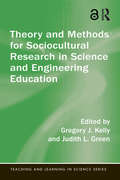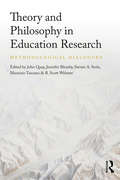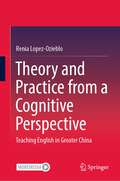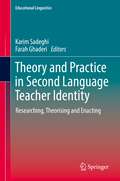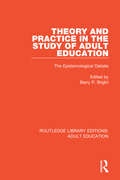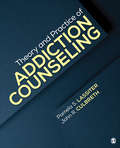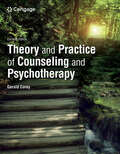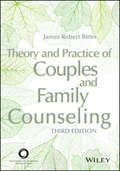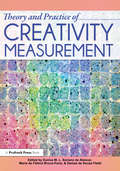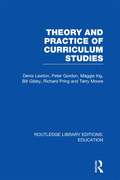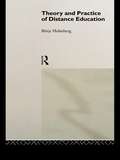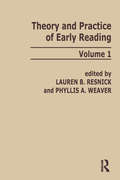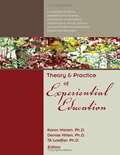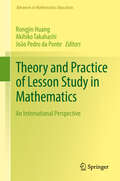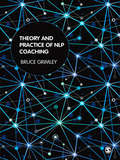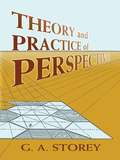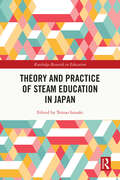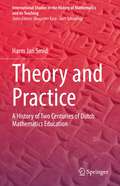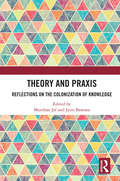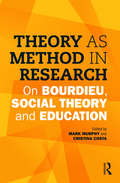- Table View
- List View
Theory Of Knowledge
by Eileen Dombrowski Lena Rotenberg Mimi BickThe only DP TOK resource developed with the IB. Build confident critical thinkers who can process and articulate complex ideas in relevant, real-life contexts. The enquiry-based approach actively drives independent thought and helps learners connect ideas and frameworks while pushing them above and beyond typical TOK boundaries. Completely mappedto the new 2013 syllabus. Supporting IB Theory of Knowledge: Skills and Practice book also available.
Theory and Applications of Satisfiability Testing - SAT 2016
by Nadia Creignou Daniel Le BerreThis book constitutes the refereed proceedings of the 19th International Conference on Theory and Applications of Satisfiability Testing, SAT 2016, held in Bordeaux, France, in July 2016. The 31 regular papers, 5 tool papers presented together with 3 invited talks were carefully reviewed and selected from 70 submissions. The papers address different aspects of SAT, including complexity, satisfiability solving, satisfiability applications, satisfiability modulop theory, beyond SAT, quantified Boolean formula, and dependency QBF.
Theory and Applications of Smart Cameras
by Chong-Min KyungThis book presents an overview of smart camera systems, considering practical applications but also reviewing fundamental aspects of the underlying technology. It introduces in a tutorial style the principles of sensing and signal processing, and also describes topics such as wireless connection to the Internet of Things (IoT) which is expected to be the biggest market for smart cameras. It is an excellent guide to the fundamental of smart camera technology, and the chapters complement each other well as the authors have worked as a team under the auspice of GFP(Global Frontier Project), the largest-scale funded research in Korea. This is the third of three books based on the Integrated Smart Sensors research project, which describe the development of innovative devices, circuits, and system-level enabling technologies. The aim of the project was to develop common platforms on which various devices and sensors can be loaded, and to create systems offering significant improvements in information processing speed, energy usage, and size. This book contains extensive reference lists, introduces the reader to the subject in a tutorial style and also reviews state-of-the-art results, which allows it to be used as a guide for starting researchers.
Theory and Educational Research: Toward Critical Social Explanation (Critical Youth Studies)
by Jean AnyonMost empirical researchers avoid the use of theory in their studies, providing data but little or no social explanation. Theoreticians, on the other hand, rarely test their ideas with empirical projects. As this groundbreaking volume makes clear, however, neither data nor theory alone is adequate to the task of social explanation—rather they form and inform each other as the inquiry process unfolds. Theory and Educational Research bridges the age-old theory/research divide by demonstrating how researchers can use critical social theory to determine appropriate empirical research strategies, and extend the analytical, critical – and sometimes emancipatory – power of data gathering and interpretation. Each chapter models a theoretically informed empiricism that places the data research yields in constant conversation with theoretical arsenals of powerful concepts. Personal reflections following each chapter chronicle the contributors’ trajectories of struggle and triumph utilizing theory and its powers in research. In the end this rich collection teaches education scholars how to deliberately engage with critical social theory in research to produce work that is simultaneously theoretically inspired, politically engaged, and empirically evocative.
Theory and Methods for Sociocultural Research in Science and Engineering Education (Teaching and Learning in Science Series)
by Gregory J. Kelly Judith L. GreenIntroducing original methods for integrating sociocultural and discourse studies into science and engineering education, this book provides a much-needed framework for how to conduct qualitative research in this field. The three dimensions of learning identified in the Next Generation Science Standards (NGSS) create a need for research methods that examine the sociocultural components of science education. With cutting-edge studies and examples consistent with the NGSS, this book offers comprehensive research methods for integrating discourse and sociocultural practices in science and engineering education and provides key tools for applying this framework for students, pre-service teachers, scholars, and researchers.
Theory and Philosophy in Education Research: Methodological Dialogues
by John Quay Steven A. Stolz Jennifer Bleazby Maurizio Toscano R. Scott WebsterThe issue of methodology is a fundamental concern for all who engage in educational research. Presenting a series of methodological dialogues between eminent education researchers including Michael Apple, Gert Biesta, Penny Enslin, John Hattie, Nel Noddings, Michael Peters, Richard Pring and Paul Smeyers, this book explores the ways in which they have chosen and developed research methods to style their investigations and frame their arguments. These dialogues address the specialized and technical aspects of conducting educational research, conceptualize the relationship between methodology and theory, and provide in-depth discussion of concerns including falsifiability, openness, interpretation and researcher judgement. Foregrounding the researchers’ first-hand experience and knowledge, this book will provide future and current researchers with a deeper comprehension of the place of theory in education research. An illuminating resource for undergraduate and postgraduate researchers alike, Theory and Philosophy in Education Research confronts the intricate complexities of conducting education research in a highly engaging and accessible way.
Theory and Practice from a Cognitive Perspective: Teaching English in Greater China
by Renia Lopez-OziebloThis book is intended as a theoretical and practical resource for both new and experienced teachers of a second language. It integrates some of the ideas from cognitive linguistics into existing classroom approaches for teaching English as a second language through a series of lesson plans developed by teachers of English from Mainland China and Hong Kong. The lesson plans provide step-by-step instructions for teachers, including resources and an explanation of the theories underpinning each step. These plans, many of which are integrated into specific English as a foreign language textbook units, encourage teachers to be creative by adding or adapting the material they have in order to engage their students. Although the main audience is English teachers, the theoretical principles covered are applicable to teachers of any foreign language and the practical examples, provided in the lesson plans, can be easily modified to teach other languages as well. Similarly, it is not just for teachers working in Chinese contexts but for anyone interested in embodied cognition as a teaching approach. I intend these pages to serve as a companion for teachers to reflect on their existing practices, to provide new ideas and to make them aware of the many factors affecting learning.
Theory and Practice in Second Language Teacher Identity: Researching, Theorising and Enacting (Educational Linguistics #57)
by Karim Sadeghi Farah GhaderiThis book brings together the current theory, research and practical perspectives from different parts of the world on language teacher identity in an attempt to better understand the nature of identities teachers in different contexts develop. By linking theory to pedagogy, the book examines how second language teacher identities are shaped and explores the various links between teacher identities and variables that affect the formation of identities. Theory and Practice in Second Language Teacher Identity includes a foreword by Jack Richards (University of Sydney and RELC), an afterword by Peter de Costa (Michigan State University) and holds 20 invited chapters by established and active scholars and teacher educators to discuss the various aspects of in-service and pre-service second language teacher identity development. It also addresses the way the COVID-19 pandemic has impacted teacher identities and examines under-researched issues, such as the intersection between gender and race in second language teacher identity development and identity construction in second languages other than English.What does it mean to be a teacher of English as a second language in an age of globalization, new media, technological revolution and de-institutionalized knowledge? How do teachers gain pre-service and in-service expertise, a sense of professional identity, and educational integrity? And how have they dealt with the extra-burden imposed by the pandemic? This thought-provoking volume offers valuable perspectives on these important issues in the professional development of English teachers worldwide. — Prof. Claire Kramsch, University of California, Berkeley, USA.The way we see ourselves and are seen by others influences our social and professional interactions. Teacher identity and sense of agency is therefore not merely a matter of research interest for it impacts learners and learning, which makes the topic of this book extremely important. With chapters located in a wide range of countries – from USA to Australia via UAE, Thailand and others – and drawing on a variety of research methods, the book synthesizes extant research and develops many new research avenues. It does so not only with theory in mind but with practical lessons for teachers and teacher educators and thus becomes an essential volume for our libraries and studies. — Prof. Michael Byram, University of Durham, UK.In this compelling collection, co-edited by Karim Sadeghi and Farah Ghaderi, the authors address key questions about language teacher identity in contemporary applied linguistics: What is the relationship between language teacher identity and language teacher agency? To what extent does ideology impact language teacher identity? How do language teachers navigate an increasingly globalized and unequal world? Authors from different regions of the world draw on diverse methodologies to share insightful research on both pre-service and in-service language teacher identity, making an important contribution to applied linguistics and TESOL at a time of great social and educational change. — Prof. Bonny Norton (FRSC), University Killam Professor and Distinguished University Scholar, University of British Columbia, Canada.“Theory and Practice in Second Language Teacher Identity” captures recent thinking about language teacher identity. The broad array of excellent chapter contributions explores multiple dimensions of identity, from teacher agency and emotions to the disruptive effects of the Covid pandemic on teachers’ professional lives and practices. The studies draw on a number of theoretical perspectives and demonstrate the use of both familiar and innovative research methodologies. The relevant topics, the up-to-date bibliographic sources, and the useful research findings make this edited volume an essential addition to your bookshelf. — Prof. Gary Barkhuizen, University of Auckland, New Zealand.
Theory and Practice in the Study of Adult Education: The Epistemological Debate (Routledge Library Editions: Adult Education)
by Barry P. BrightOriginally published in 1989, this book presents a variety of perspectives on the definition of knowledge and of adult education, by leading authors and practitioners in the study of adult education in the UK and USA. This collection of different and often contradictory views makes a detailed analysis of the epistemology and practice of adult education. Three major views are reflected within the book, all of which focus upon the role of the conventional disciplines as a 'theoretical' basis for adult education curricula and professional practice.
Theory and Practice of Addiction Counseling
by John R. Culbreth Pamela S. LassiterThis one-of-a-kind text brings together contemporary theories of addiction and helps readers connect those theories to practice using a common multicultural case study. Theories covered include motivational interviewing, moral theory, developmental theory, cognitive behavioral theories, attachment theory, and sociological theory. Each chapter focuses on a single theory, describing its basic tenets, philosophical underpinnings, key concepts, and strengths and weaknesses. Each chapter also shows how practitioners using the theory would respond to a common case study, giving readers the opportunity to compare how the different theoretical approaches are applied to client situations. A final chapter discusses approaches to relapse prevention.
Theory and Practice of Addiction Counseling
by John R. Culbreth Pamela S. LassiterThis one-of-a-kind text brings together contemporary theories of addiction and helps readers connect those theories to practice using a common multicultural case study. Theories covered include motivational interviewing, moral theory, developmental theory, cognitive behavioral theories, attachment theory, and sociological theory. Each chapter focuses on a single theory, describing its basic tenets, philosophical underpinnings, key concepts, and strengths and weaknesses. Each chapter also shows how practitioners using the theory would respond to a common case study, giving readers the opportunity to compare how the different theoretical approaches are applied to client situations. A final chapter discusses approaches to relapse prevention.
Theory and Practice of Counseling and Psychotherapy
by Gerald CoreyIncorporating the thinking, feeling and behaving dimensions of human experience, the Eleventh Edition of Corey's best-selling text offers an easy-to-understand guide to help you compare and contrast the therapeutic models expressed in counseling theories. This wide-ranging text provides a thorough introduction to major theories including psychoanalytic, Adlerian, existential, person-centered, Gestalt, reality, behavior, cognitive-behavior, family systems, feminist, postmodern and integrative approaches. <p><p>With his trademark style, the author also demonstrates how each theory can be applied to two cases (""Stan"" and “Gwen”), providing valuable practical insights and helping you learn to integrate the theories into an individualized counseling style. In addition, the text features engaging media resources, available through MindTap, such as case-focused videos to help bring the material vividly to life.
Theory and Practice of Couples and Family Counseling
by James Robert BitterThis introduction to couples and family counseling lays the foundation for student skill-building by encouraging the development of personal, professional, and ethical standards of practice. This third edition has been expanded to include couples counseling and updated to reflect recent research and current practice. Primary text features include a genogram delineating the history of the field; a comprehensive discussion of 13 widely used theories with real-life examples of quality work for each approach; a single, bicultural couple/family system case for comparison across models; and strategies for the integration and application of the models into clinical practice with diverse clients. To help readers apply the concepts they have learned, Dr. Bitter provides numerous Illustrative examples, case studies, sample client dialogues, and exercises for personal and professional growth. *Requests for digital versions from ACA can be found on www.wiley.com. *To purchase print copies, please visit the ACA website here *Reproduction requests for material from books published by ACA should be directed to permissions@counseling.org
Theory and Practice of Creativity Measurement
by Eunice Soriano De Alencar Maria De Fatima Bruno-Faria Denise De Souza FleithTheory and Practice of Creativity Measurement explores important and fascinating topics related to the assessment of creativity. An introductory chapter provides an overview of numerous measures to assess the multiple dimensions of creativity and addresses the parameters to be considered when evaluating the quality of the available instruments, as well as the steps to be taken in their administration and interpretation. The next six chapters each describe an instrument designed to assess a variable related to creativity, such as obstacles to personal creativity, classroom climate for creativity, creativity in mathematics, and creativity strategies at the work setting. These instruments may be used in the school context or in the workplace for diagnostic purposes and for planning intervention strategies to facilitate the development and expression of the capacity to create. The book offers numerous insights that may be a source of inspiration for researchers in the area, unveiling new possibilities for promotion of creativity.
Theory and Practice of Curriculum Studies (Routledge Library Editions: Education)
by Denis LawtonThis book deals with curriculum issues and problems, and one of its aims is to help practising teachers to clarify their own theory and practice in relation to the curriculum. The contributors look at three popular theories or sets of assumptions held by teachers: the child-centred view of education; the subject-centred or knowledge-centred view; and the society-centred view. Each of these views is incomplete on its own, but each has something to contribute in planning a curriculum as a whole, and the authors emphasize that a comprehensive theory of curriculum planning would take into account the individual nature of the pupil and also recognize the social value of education. This kind of comprehensive curriculum planning has been described as the situation-centred curriculum, based on the idea that schools should be concerned with preparing the young for the world as it will be when they leave school. One of the purposes of education is to develop a child’s autonomy; he or she must learn to cope with the variety of situations which will face him or her in society. Thus many different approaches must be employed in establishing a basis for the complex task of curriculum planning. The book draws on the disciplines of philosophy, psychology, history and sociology to suggest new approaches to curriculum objectives and evaluation. It considers the theoretical bases of curriculum models, practical issues of planning, evaluation and pedagogy and discusses some urgent contemporary questions about the politics and control of the curriculum.
Theory and Practice of Distance Education (Routledge Studies in Distance Education)
by Borje HolmbergDistance education is practised in all parts of the world and in recent years, its scope has developed enormously and rapidly. It has become an intrinsic part of many national educational systems and an academic discipline in its own right. Research into the area has produced a body of theory which is now being used to improve its practice.This new edition of Theory and Practice of Distance Education has been thoroughly updated both by describing how practice has changed, and by examining recent research in the field. Like the first edition, this book provides a comprehensive survey of distance education, looking at it globally and discussing the different lines of thought and models used. It describes the place of distance education in educational thinking, its various theories, principles, and techniques of presentation, its organization and its administration.
Theory and Practice of Early Reading: Volume 1
by Lauren B. Resnick and Phyllis A. WeaverFirst Published in 1979. Routledge is an imprint of Taylor & Francis, an informa company.
Theory and Practice of Experiential Education: A Collection of Articles Addressing the Historical, Educational, Philosophical, Psychological, Ethical, Spiritual, and Social Justice Foundations of Experiential Education
by Denise Mitten Karen Warren T. A. Loeffler Association for Experiential Education StaffIn the early days of the Association for Experiential Education, it was often noted that experiential education was experience rich but theory poor. In 1985, the Association for Experiential Education (AEE) published the first edition of this book to help rectify the dilemma. We are pleased to introduce the 4th edition of the original text, which has been re-titled Theory & Practice of Experiential Education. The relationship between theory and practice in experiential education rests on a profound creative tension. As we become more theory based in the application of experiential education, it is essential to maintain the delicate balance between theory and practice. Theory informs practice, while practice tests and refines theory. This book is an attempt to offer the richness of theory that clarifies practice. <p><p>Since that first edition was published back in 1985, there have been some key developments in the theory of experiential education, and the editors of this volume have strived to make this edition reflective of that evolution. The classic chapters retained from previous editions give the reader a sense of both the timelessness and progression of ideas about experiential education. Some of the new chapters cover topics such as multiple intelligence theory, constructivism, brain-based learning theory, educational reform, and facilitation analysis. Yet others critique how experiential education is articulated and practiced, offering new theories and methods. <p><p>The result is an excellent teaching resource for undergraduate and graduate courses about education theory and courses specifically in experiential education. It is the editors hope that educators will make this book their own by using the articles that work for their teaching style and students in an order that fits their course progression.
Theory and Practice of Lesson Study in Mathematics: An International Perspective (Advances in Mathematics Education)
by Rongjin Huang João Pedro da Ponte Akihiko TakahashiThis book brings together and builds on the current research efforts on adaptation, conceptualization, and theorization of Lesson Study (LS). It synthesizes and illustrates major perspectives for theorizing LS and enriches the conceptualization of LS by interpreting the activity as it is used in Japan and China from historical and cultural perspectives. Presenting the practices and theories of LS with practicing teachers and prospective teachers in more than 10 countries, it enables the reader to take a comparative perspective. Finally, the book presents and discusses studies on key aspects of LS such as lesson planning, post-lesson discussion, guiding theories, connection between research and practice, and upscaling.Lesson Study, which has originated in Asia as a powerful effective professional development model, has spread globally. Although the positive effects of lesson study on teacher learning, student learning, and curriculum reforms have been widely documented, conceptualization of and research on LS have just begun to emerge. This book, including 38 chapters contributed by 90 scholars from 21 countries, presents a truly international collaboration on research on and adaptation of LS, and significantly advances the development of knowledge about this process.Chapter 15: "How Variance and Invariance Can Inform Teachers’ Enactment of Mathematics Lessons" of this book is available open access under a CC BY 4.0 license at link.springer.comTheory and Practice of Lesson Study in Mathematics: An International Perspective shows that the power of Lesson Study to transform the role of teachers in classroom research cannot be explained by a simple replication model. Here we see Lesson Study being successful internationally when its key principles and practices are taken seriously and are adapted to meet local issues and challenges. (Max Stephens, Senior research fellow at The University of Melbourne)It works. Instruction improves, learning improves. Wide scale? Enduring? Deep impact? Lesson study has it. When something works as well as lesson study does, while alternative systems for improving instruction fail, or only succeed on small scale or evaporate as quickly as they show promise, it is time to understand how and why lesson study works. This volume brings the research on lesson study together from around the world. Here is what we already know and here is the way forward for research and practice informed by research. It is time to wake up and pay attention to what has worked so well, on wide scale for so long.(Phil Dara, A leading author of the Common Core State Standards of Mathematics in the U.S.)
Theory and Practice of NLP Coaching: A Psychological Approach
by Bruce Grimley'Inspiring, stimulating, and immensely rich - Bruce takes NLP in Coaching to an entirely new dimension, building on the giants before him' - Katherine Tulpa, Global CE0, Association for Coaching 'I recommend this book whole heartedly to any coach who wishes to update their knowledge and understanding of NLP and coaching' - Prof. Dr. Karl Nielsen, IN President 'Immensely readable and well researched. No NLP practitioner wanting to develop the field further should be without it' - Dr Jane Mathison, formerly research officer in NLP, University of Surrey Are you struggling with the complexities of Neuro-Linguistic Programming (NLP)? You've come to the right place. This book demystifies NLP, providing a practical guide to understanding the psychological theories, principles and research that underpin the approach. Packed with practical hints and tips, case studies and exercises, the book introduces and explores: - What NLP coaching actually is - The general theories and principles that underpin the NLP approach - How theory translates into practice - The research evidence that says NLP coaching really works This is an essential companion for trainees, coaches, psychologists and professionals from all walks of life - indeed, anyone wanting to develop their knowledge and practical skills in this increasingly popular approach. Bruce Grimley is Managing Director of Achieving Lives Ltd, an Associate Fellow of the British Psychological Society and the UK President of the International Association of NLP Institutes and Coaching Institutes.
Theory and Practice of Perspective
by G. A. StoreyLeonardo da Vinci declared that the first lessons for all aspiring artists should involve perspective, and this authoritative guide assists artists at all levels in following the master's advice. Its scores of concise chapters cover a vast range of subjects, offering a comprehensive view of one of art's most difficult challenges: the accurate re-creation of natural perspective. Discussions of theory encompass definitions, both scientific and informal; the horizon and the points of sight and distance; and rules and conditions of perspective. The majority of the text examines the practice of perspective, featuring instruction on how to reproduce shape, distance, proportion, shade, shadow, reflection, and other aspects that endow two-dimensional works with lifelike qualities. More than 300 illustrations and diagrams make this an exceptionally clear and thorough treatment and an essential guide for students of art, architecture, and design.
Theory and Practice of STEAM Education in Japan (Routledge Research in Education)
by Tetsuo IsozakiWith unique insights into the potential power of Japan’s STEM education, Isozaki and his team of contributors share multiple perspectives on STEM education theory and practices in Japan.Examining how Japan has become an economic superpower based on scientific and technological innovations, this book provides a particular focus on the theoretical and practical analysis of STEM education from historical and comparative perspectives. Additionally, it links the theory and practice of STEM education from primary education to teacher education at universities across Japan and considers both societal and individual needs in advancing STEM literacy. Chapters are written by researchers from a diverse range of fields in education, including science, mathematics, technology, and pedagogy. The book also offers practical teaching tools and materials for teacher education and assessment to promote STEM literacy in students so that they are able to address local and global socio-scientific issues in a real-world context.Covering a wide spectrum of STEM education, this book provides valuable insights and practical suggestions, from a Japanese perspective, for academic researchers, policymakers, and educators who are interested in STEM education.
Theory and Practice: A History of Two Centuries of Dutch Mathematics Education (International Studies in the History of Mathematics and its Teaching)
by Harm Jan SmidThis book describes and analyses the history of Dutch mathematics education from the point of view of the changing motivations behind the teaching of mathematics over a 200 year period. During the course of the 19th century, mathematics in the Netherlands developed from a topic for practitioners into a school topic that was taught to almost all pupils of secondary education. As mathematics teaching gradually lost its practical orientation and became more and more motivated on the basis of its supposed formative value, the HBS (Hogere Burgerschool), the Dutch variant of the German Realschule, became the dominant school of thought for mathematics pedagogy. This book examines the gradual development of the field, culminating in the country-wide adoption of Realistic Mathematics Education as the new method of mathematics teaching. This book is important for anyone who is interested in the history of mathematics education. It provides an interesting perspective on the development of mathematics education in a country that, in many aspects, went its own way.
Theory and Praxis: Reflections on the Colonization of Knowledge
by Potter Murzban Jal Jyoti BawaneThis book proposes a New Enlightenment – a new way of looking at the non-Western world. Breaking new ground, the essays chart a course beyond Eurocentric discourses (which completely ignore the contributions of Asia, Africa and Latin-America) and forms of nativism (which are usually ethnocentric discourses). The volume: Focuses on the historical aspects of knowledge-production and its colonization; Examines the genre of multilinear histories that displaces hegemonic Eurocentric discourses; Enlarges the scope of multilinear historicism whereby Asia, Europe, Africa and the Americas are drawn in a new humanistic knowledge system; Studies how colonization is resisted in both the non-Western and Western world. Lucid and engaging, this book will be of great interest to scholars and researchers of social theory, education, politics and public policy.
Theory as Method in Research: On Bourdieu, social theory and education
by Cristina Costa Mark MurphyWhile education researchers have drawn on the work of a wide diversity of theorists over the years, much contemporary theory building in these areas has revolved around the work of Pierre Bourdieu. Theory as Method in Research develops the capacity of students, researchers and teachers to successfully put Bourdieu’s ideas to work in their own research and prepare them effectively for conducting Masters and Doctoral scholarships. Structured around four core themes, this book provides a range of research case studies exploring educational identities, educational inequalities, school leadership and management, and research in teacher education. Issues as diverse as Chinese language learning and identity, school leadership in Australia and the school experience of Afro-Trinidadian boys, are covered, intertwined with a set of innovative approaches to theory application in education research. This collection brings together, in one comprehensive volume, a set of education researchers who place Pierre Bourdieu’s key concepts such as habitus, capital and field at the centre of their research methodologies. Full of insight and innovation, the book is an essential read for practitioners, student teachers, researchers and academics who want to harness the potential of Bourdieu’s core concepts in their own work, thereby helping to bridge the gap between theory and method in education research.
